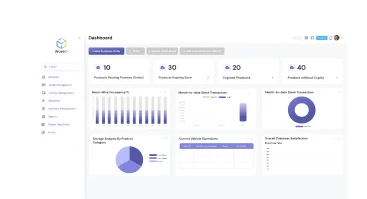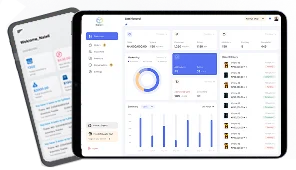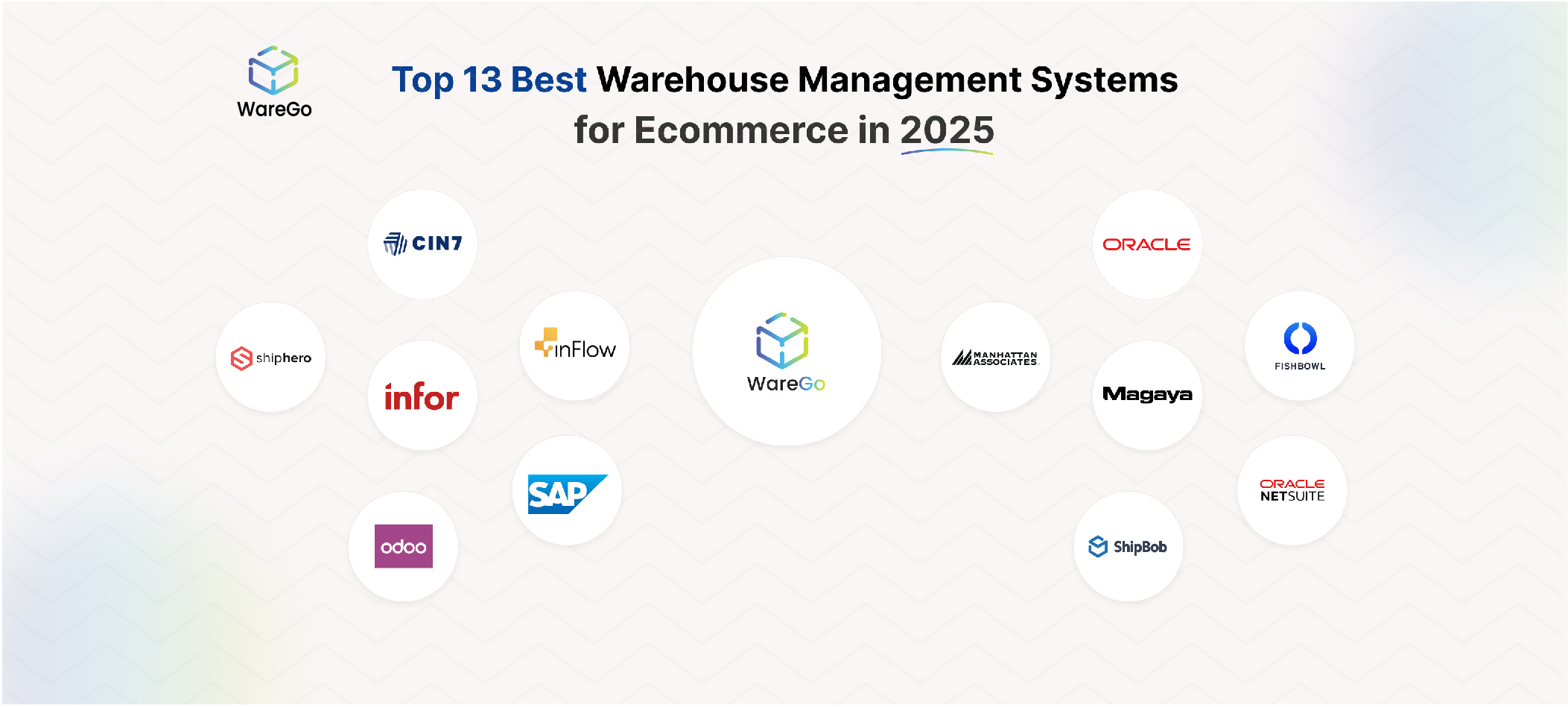
Frequent stockouts, lost or misplaced inventory, and difficulty in tracking expiry dates or batch numbers leave no choice for businesses but to invest in the best wms for ecommerce.
A WMS software improves ecommerce business operations by organizing the inventory, offering clear visibility, and adding efficiency to the processes. When you integrate an ecommerce WMS into your systems, it automates the way orders are processed, stock levels are managed, and shipments are sent.
So, if you are reviewing ecommerce warehouse management system for businesses, our 13 best picks are all you need to know. Our comprehensive read has a broad horizon, other than the best ecommerce WMS software options, it includes features to look for and a checklist for choosing a WMS for your ecommerce business.
Let’s not waste more time on ado and quickly begin with our read.
Table of Contents
13 Best Warehouse Management Systems for ecommerce to Boost Your Efficiency & Sales
The following are Google’s reviewed and recommended 13 best warehouse management systems for ecommerce. Read on to find the one for your business.
1. WareGo
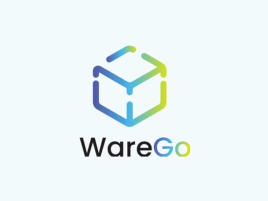
WareGo is a well-established name in the ecommerce industry. It is the best wms for ecommerce that elevates the speed and efficiency of multichannel sales operations. Whether you carry out operations online or onsite, or retail or wholesale, our centralized one-unit system covers every aspect of ecommerce businesses and connects them with relevant platforms, from shipping platforms to marketplaces, ecommerce platforms, ERP, and CRM. WareGo, the no.1 WMS choice for ecommerce businesses, is built to help companies manage thousands of SKUs, offering end-to-end fulfilment across all channels, and easily deal with peak order volume. With our software by your side, you can hold complete control of your inventory, workflows, and overall operational speed.
Key Features
- Backorder management
- Bundle/kitting software workflows
- Cart abandonment sync
- Preorder fulfillment tools
- Marketplace stock syncing
- Return reason tracking
- Discount-aware picking
- Peak season scaling
- Promo code integration
- Channel-specific packaging
- Customer-specific SLAs
- eCommerce API integrations
Integrations
- BigCommerce
- Magento 2
- MyStoreNo
- WooCommerce
- Shopify
Pricing
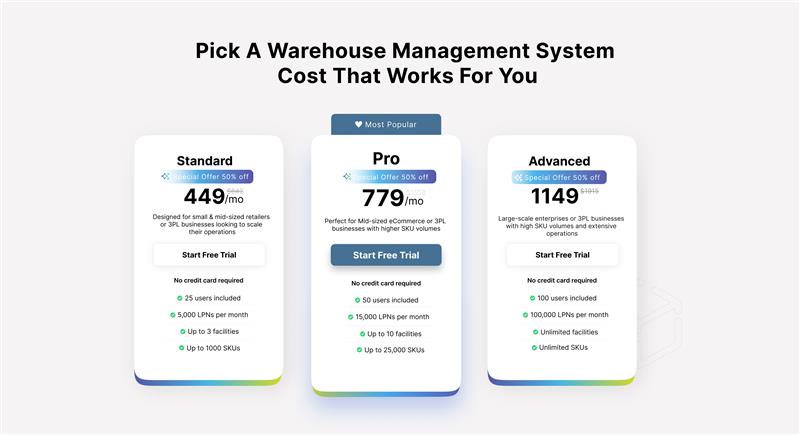
Relatively on the cheaper side as compared to other ecommerce WMS software in the market, WareGo offers three price models to ensure the software accommodates all types and sizes of ecommerce businesses.
- The Standard package starts at $449
- The Pro package costs $779
- The Advance package charges $1149
Best For
- E-commerce
- Third Party Logistics
- Food & Beverage
- Restaurant
- Wholesale Distribution
- Cold Storage
Put an end to juggling sheets, missed orders, and delayed shipments with WareGo, an ultimate WMS for ecommerce. Our software connects you with top ecommerce platforms while offering perks like real-time visibility, reporting/analytics, and full control over every order that is received till delivered.
Start a Free Demo2. FishBowl

Fishbowl is another great WMS for ecommerce businesses that meet high operational standards with its robust development and scope. It streamlines businesses’ operations with features like real-time inventory tracking, automatic order management, and error-free barcode scanning. Fishbowl has a competitive edge in the market due to its ease of integration with QuickBooks to simplify data management, helping clients reduce the tension of stock levels and other financial records. When clients invest in this WMS, they get a worker who is efficient in warehouse management and accounting.
Key Features
- Optimized picking processes
- Streamlined packing procedures
- Integrated shipping solutions
- Intelligent reordering
Integrations
- QuickBooks Payments
- Salesforce
- Webshop Manager
- OnTrac
- USPS
Pricing
Fishbowl has 4 different subscription packages, but they do not have their charges listed.
Basic Inventory
Commerce Suite
Advanced Warehousing
Advanced Manufacturing
Best For
- QuickBooks Users
- Small to Medium-Sized Businesses
- Manufacturing
- E-commerce
- Complex Inventory Tracking
3. Cin7

Cin7 is another great selection on our list, as it is a cloud-based order management and inventory software built to help small to medium-sized businesses carry out business operations through different channels. The software is robust in offering inventory, orders, sales channels, warehouses, and more from 1 all-integrated platform. The WMS company has a brilliant customer service team onboard that provides support 24/7 365 to make sure clients are served well. The onboarding process is led by industry experts so that clients begin with clarity in mind.
Key Features
- Real-time Inventory Tracking
- Barcode Scanning
- e-commerce Integrations
- Automation Processes
- Purchasing
Integrations
- Xero
- QuickBooks
- Shopify
- Amazon
- ShipStation
Pricing
Cin7 offers four different price plans to meet clients’ diverse needs, business size, and other factors. One thing to note is that their prices are excluding taxes, thus thorough price discussion is necessary before you invest.
- The standard package starts at $349/month.
- Pro Package starts at $599/month
- The advanced price plan charges $999 every month.
- The Omni package does not have a price listed on the website. You need to contact the team to know about the cost.
Best For
- Manufacturers
- Wholesalers
- Retailers in fashion
- Health and beauty companies
- Food and beverage businesses
Still shuffling through WMS options to find the best one? Let us make it easy for you. Reach out to our consultants today for free to discover how WareGo makes doing business easy with features like complete inventory visibility, automated daily tasks, and overall improved order accuracy.
Call Us Now4. Manhattan Associates

Manhattan is more than a wms and claims to offer solutions beyond the supply chain. Along with great software, they have an efficient team onboard that helps clients find tools that brilliantly improve their ecommerce business operations. This WMS can deliver a priceless experience to its customers thanks to the cloud native technology and a top-notch collaboration with the service partners. With a set of features aimed at improving e-commerce operations, such as delivering products securely and right on time to consumers, this solution is a great pick for clients searching for the best e-commerce WMS.
Key Features
- Robust inventory management
- Order fulfilment
- Labour management tools
- Slotting optimization
- Order streaming
Integrations
- Easypost
- Shopify
- Adyen
- Sendflex
- Trimble
Pricing
There is no clear pricing mentioned on the Manhattan website. Contact their team to get the price structure or a free demo.
Best For
- Retail
- Distribution
- Manufacturing
- Large Organizations
- Complex Supply Change Industries
5. Magaya Supply Chain
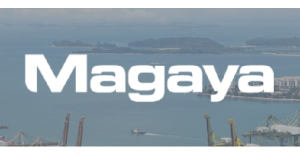
Magaya was built with a basic yet concerning thought in mind that working in a disconnected environment can become the reason for killing productivity. The software connects warehouse systems, whether you are working with a few or a whole set of complex software. Not just tools or systems, Magaya WMS is great with managing warehousing located in different locations with a single interface. It is made to simplify warehousing businesses with small, medium, or large teams. For ecommerce businesses, the feature that connects accounting with warehouse management transactions helps them keep track of payments while ensuring no errors are made during the process.
Key Features
- Advanced Inventory & Warehouse Management
- Integrated Order & Shipment Processing
- Automation & Smart Tools
- Customer & Driver Interaction Tools
- Accounting & Billing Integration
Integrations
- Paypal
- Intuit QuickBooks
- Slack
- Shopify
- Oracle
Pricing
Magaya, one of the best wms for ecommerce, has not listed its pricing on the website. They offer custom pricing based on the client’s scope and needs.
Best For
- Freight Forwarding
- Export Operations
- Logistics Providers
- Supply Chain Management
- E-commerce Integration
6. ShipHero, LLC

ShipHero is another renowned name in the ecommerce industry. They started with a vision of becoming a warehousing operation leader, an employer, and a partner that helps ecommerce and fulfillment businesses grow efficiently. Their software focuses on the success of its customers by making warehousing operations convenient. With this WMS for ecommerce by your side, companies and fulfillment providers can easily ship ecommerce. Unlike those who work to make money, this software solution is high on impacting how ecommerce is shipped worldwide. Shiphero WMS solves complex operational problems with abundant features and integration options, making clients trust it wholeheartedly.
Key Features
- Labor management & cost dashboard
- 3pl client portal
- Receiving and putaway
- Live Carrier Rate Shopping
- Return Management
Integrations
- Shopify
- Fedex
- Amazon
- 99Minutos
- Loop Returns
Pricing
Like most ecommerce wms, ShipHero does not have its pricing mentioned on the website. For custom prices, reach out to their customer care.
Best For
- E-commerce businesses
- 3PLs (Third-Party Logistics)
- Large enterprises
- Direct-to-consumer (DTC) shipping
- Retail Businesses
7. Oracle
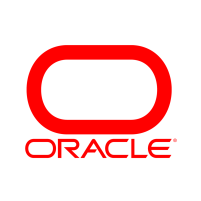
Oracle does not need any introduction in the information technology field, this tech giant has multiple products and services that have been making life easier for clients around the world. Among all products and services, Oracle’s WMS stands tall, helping e-commerce businesses experience ease of operations with tools that meet the challenges they face in today’s saturated business market. The development team understood that the market is demand-driven, and to help clients with complex fulfillment operations, they have introduced features that bring complete visibility to inventory, be it a distribution centre or store shelf.
Key Features
- Advanced Wave Management
- Storage and Facility Management
- Value Added Services
- Reverse Logistics
- Integration with Cloud WMS
Integrations
- Oracle and non-Oracle ERP solutions
- FedEx, UPS, DHL, etc.
- Oracle SCM Cloud
- Oracle Integration Cloud
- Most Transportation Management Systems
Pricing
Oracle WMS has not listed its pricing publicly. For pricing, reach out to their customer service team or request a free demo.
Best For
- Retail and E-commerce
- Wholesale Distribution
- Manufacturing
- Logistics Service Providers (3PLs)
- Consumer Goods
Lost stock? Experiencing slow shipping? Or going through constant firefighting? Let WareGo, a made-to-match WMS for ecommerce businesses, cover your revenue and reclaim your time with automation that actually works. With us, you get guaranteed affordability, customer satisfaction, and improved profitability on every order.
View Pricing8. ShipBob

ShipBob is a known 3PL provider and wms designed specifically for ecommerce businesses. The company has a universal network of fulfillment and an intuitive software that helps businesses look after their inventory, add automation to shipping, and deliver an experience to customers that is unlike other ecommerce WMS. The software has features like real-time insights, inventory management and distribution, and integrations with all top ecommerce platforms. Shipbob is an ideal solution for businesses planning to scale shortly and want to automate operations for better performance and accuracy. The end-to-end solutions of this WMS help companies to grow quickly, deliver timely, and streamline logistics.
Key Features
- Distributed inventory across fulfillment centers
- Real-time inventory tracking
- Automated order processing
- Same-day fulfillment
- Detailed shipping analytics
Integrations
- Shopify
- WooCommerce
- BigCommerce
- Amazon
- Walmart Marketplace
Pricing
ShipBob does not have pricing listed online. They generally charge as per the client’s needs and automation requirements.
Best For
- DTC ecommerce brands
- Subscription box companies
- Growing Shopify stores
- Brands without warehousing
- U.S. and global shipping
9. By infor

Infor WMS secures the ninth position on our list for being a powerful yet scalable warehouse software. It is built for businesses with complex supply chain operations that need software to streamline them and make them easy to manage. As a professional solution, it helps ecommerce businesses with advanced automation, intelligent fulfilment capabilities, and real-time data so that managers stay ahead of the curve. Other benefits that ecommerce companies can avail themselves of this software include picking accuracy, reducing labor costs, and improved visibility across the supply chain. With the back of AI-powered analytics and cloud deployment, this WMS offers enterprise-level efficiency with a good amount of flexibility for mid-sized businesses.
Key Features
- Advanced wave and batch picking
- AI-driven labor management
- Real-time inventory visibility
- Cloud-native architecture
- Task interleaving and voice picking
Integrations
- Salesforce
- Shopify (via partners)
- SAP
- NetSuite
- Infor ERP
Pricing
Infor WMS does not have its pricing listed on its website. Contact their team to get a quote.
Best For
- High-volume ecommerce operations
- Omnichannel retailers
- Third-party logistics providers
- Global fulfillment networks
- Enterprises with complex supply chains
10. Odoo

Odoo is another brilliant pick, one of its own kind. This open-source ERP suite has a detailed WMS module that works perfectly for ecommerce businesses. The modular structure and flexibility benefit merchants in dealing with purchasing, inventory, sales, fulfilment, and more, all from one single dashboard. Being an open-source software, the customization options are great, and clients can tailor it to meet their specific needs. There are other brilliant features too that come along with this software, like timely tracking of inventory, barcode support, and some great automation rules. With Adoo by your side, you can optimize your warehouse operations, making a quick and accurate sync with your online store. The affordable nature of this WMS makes it the right choice for startups and small businesses that are starting out in the ecommerce industry.
Key Features
- Modular WMS system
- Smart put-away and picking
- Barcode scanning
- Real-time inventory updates
- Automated replenishment
Integrations
- Odoo Ecommerce
- Magento
- Shopify (via connectors)
- Amazon
- WooCommerce
Pricing
Since it is an open-source wms, it offers a partnership instead of subscriptions. The two partnership options listed on the website include:
- Learning partner that provides basic functionality comes at US$ 390.00.
- Official partnership includes a wide range of functionality and comes at a price tag of
US$ 1,950.00.
Please contact their customer for onboarding charges and other additional fees.
Best For
- Small to mid-sized ecommerce businesses
- Companies using Odoo ERP
- Customizable warehouse workflows
- Tech-savvy teams
- Budget-conscious brands
In the ecommerce industry, time is money. With WareGo by your side, you can fulfil orders faster, restock smartly, and gain more repeat customers after every order. While your competitors work with old outdated systems, earn a competitiev edge by outshining them with brilliant workflows and unique automation.
Start Now11. Inflow Inventory

In ecommerce businesses, managing inventory is a difficult task. Inflow inventory is all you need if you are struggling with it, too, and you just need an inventory management system to deal with the complexities. This software is a great deal for small ecommerce businesses handling multi-channel ecommerce, as it combines sales and purchase management capabilities. Features including mobile applications, barcode generation, and built-in invoicing make Inflow valuable, allowing it to simplify the entire process of an ecommerce business from tracking inventory to fulfilling orders. The convenience of setup and timely support make this software a considerable choice for growing online businesses that need a robust tool with features that ease complexities.
Key Features
- Real-time stock tracking
- Mobile WMS app
- Barcode scanning and label printing
- Order and invoice management
- Multi-location inventory
Integrations
- Shopify
- QuickBooks
- Amazon
- WooCommerce
- Zapier
Pricing
Inflow inventory works with 3 convenient price models. The details include:
- An entrepreneur package for 2 team members starts at 149 USD/mo.
- Their most popular package, which is the small business package, consists of 5 members and begins at 349USD/mo.
- The third and most comprehensive one, the Mid-Size package, includes 10 members and begins at 799 USD/mo.
Best For
- Small ecommerce businesses
- Inventory tracking across channels
- Retailers with basic WMS needs
- Startups with physical products
- Companies needing invoicing + WMS
12. Netsuite

Oracle NetSuite does not need any introduction, as it is a well-known warehouse system with a cloud-based nature that you can integrate with your comprehensive NetSuite ERP. This specific tool of Oracle is designed to help flourishing ecommerce businesses and enterprise-level ecommerce companies manage complex processes such as fulfilment, real-time inventory control, and demand planning and forecasting. With this software, you can automate the warehouse management operations while syncing the orders and inventory with the financials and CRM. Combined with a broader NetSuite ERP, this WMS offers a complete solution that covers all operational aspects. The depth and scalability of NetSuite make this WMS a trusted solution for serious ecommerce scaling.
Key Features
- Intelligent order allocation
- Mobile RF barcode scanning
- Cycle counting and bin management
- Multi-location inventory
- Real-time analytics
Integrations
- NetSuite ERP
- Shopify (via SuiteApps)
- Magento
- Salesforce
- Amazon
Pricing
NetSuite WMS is available as an add-on module, and for pricing, you need to contact the customer service team.
Best For
- Mid-to-large ecommerce operations
- Businesses using NetSuite ERP
- Multi-warehouse management
- Growing online retailers
- Omnichannel fulfilment
13. SAP

Our 13th best ecommerce warehouse software is SAP EWM, an advanced WMS software designed solely for enterprise-level businesses that require strong control over their supply chain. This system provides unmatched automation, optimization algorithms, and real-time visibility, an amalgamation of features that streamline the inbound logistics operations and last-mile delivery. If your business is dealing with high volumes, complex workflows, and integrated global supply chains, SAP EWM will be ideal. This software supports IoT, robotics, and predictive analytics to earn operational excellence, becoming a top-tier solution that businesses need.
Key Features
- Automated warehouse processes
- Integration with robotics and IoT
- Flexible picking and packing
- Predictive analytics
- Complex warehouse layout management
Integrations
- SAP ERP and S/4HANA
- Shopify (via middleware)
- Salesforce
- Custom ecommerce integrations
- Amazon
Pricing
Ultimately, SAP offers 2 packages, which are subscription-based but no clear price structure is provided on the website, and clients need to book a consultation to get a customized quote.
Best For
- Large-scale e-commerce enterprises
- Global supply chains
- Complex, automated warehouses
- Businesses needing deep SAP integration
- High-volume e-commerce operations
Defining Features of the Best WMS for Ecommerce
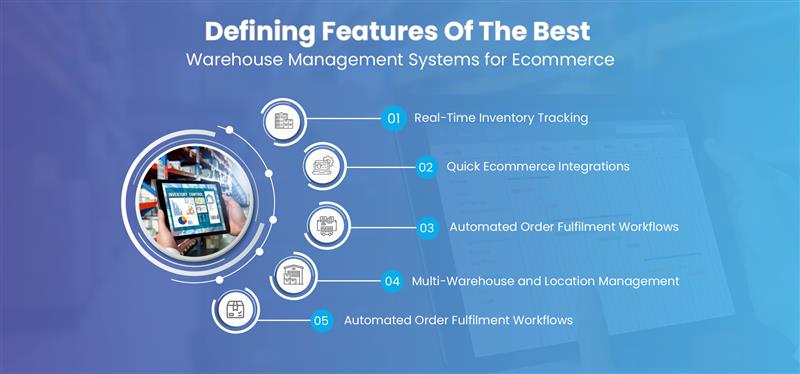
Let’s be real. Trying to succeed in the ecommerce market without the best WMS for ecommerce is like climbing a mountain with no proper hiking shoes (yes, it is frustrating, not so efficient, and obviously bound to scale you down).
A brilliant WMS for ecommerce like Warego can help you add life to your operations, eliminating pain points like frequent stockouts, late deliveries, inventory inaccuracy, and no real-time visibility into the processes.
But what features make a great ecommerce WMS? Let’s break it down so that you can differentiate between the best ecommerce WMS available and the mediocre ones.
1. Real-Time Inventory Tracking
Unlike other domains, inventory errors can cost you a lot of money, resulting in canceled orders. ecommerce WMS needs to have a real-time inventory tracking feature to reach the best level. With this feature, ecommerce business managers can view their inventory, stock levels, sales orders, poor reputation, and a disappointed customer base. For this reason, every channel and fulfilment centre lives.
Whether you are a seller on Shopify or Amazon or have your own website, a cold storage WMS with this feature gets you efficiency results by automatically updating your inventory when a sale is made, a return form is submitted, or a new product has arrived. The real-time visibility and inventory tracking help ensure no overselling is done, no backorders are there, and keep your fulfilment process running smoothly.
This feature also helps your warehouse staff with accurate and timely data to make smart sales and purchase decisions.
2. Quick Ecommerce Integrations
Today, the world and businesses work interconnectedly, especially ecommerce businesses, as they are functional on multiple platforms such as Amazon, Walmart, and online stores. One of the best WMS features is quick integration with all e-commerce channels so that clients can leverage the automatic syncing of orders, timely update of stock levels, and management of returns, all of which can be done with a single WMS dashboard.
When a 3PL warehouse management system integrates with ecommerce channels, this eliminates the need to enter data manually, decreases the error risks, and ensures that customers get a consistent experience no matter their location while placing their orders.
Quick ecommerce integrations make a WMS offer end-to-end visibility and convenient operations by syncing with your ecommerce store. Nonetheless, it is worth noting that this feature helps reduce costs and boost turnaround time.
3. Automated Order Fulfilment Workflows
Automated order fulfilment workflows are another important feature that defines the worth of your ecommerce wms. This feature helps your WMS identify and report what is in your warehouse and manage the entire order journey. Automated order fulfilment workflows make certain that once the order is placed, it automatically gets picked, packaged, and delivered with little to no manual intervention.
These systems are super efficient when it comes to optimizing pick paths, assigning tasks to the warehouse staff, printing labels for deliverables, and even pointing out reorders when they notice inventory is low.
This automatic work decreases the space for human errors, makes order processing efficient, and helps your team manage higher order volumes with fewer staff. Ultimately, this feature enables your business to scale, fulfilling orders quickly and satisfying your customer base.
4. Multi-Warehouse and Location Management
As your ecommerce business grows, managing inventory throughout your business locations, including warehouses, zones, and even different countries, becomes even more important. If you are evaluating one of the best WMS software for ecommerce, it should be built to handle complex multi-warehouse and location management easily.
The best WMS should let you look after stock levels of different locations from a single dashboard, making distribution smarter, deliveries faster, and shipping cost-effective. The benefits of this feature include routing orders to nearby fulfilment centres, splitting shipments in an intelligent way, or allocating inventory based on specific regions or sales channels.
When you have complete control over how and where inventory is placed or shipped, multi-warehouse management turns into a strategic advantage and not a logical headache.
5. Advanced Reporting & Analytics
E-commerce business operations that are data-driven tend to be more successful than others. Thus, if a WMS is all set to be known as the best, it must have advanced tools of reporting and analytics so that you can have a clear insight into every domain of your warehouse or fulfilment centre and its performance.
With this feature, you can monitor the accuracy of orders, track pick and pack times, identify slow-moving stock, and forecast based on demand and historical trends. These timely reports and accurate analytics enable e-commerce business owners to make informed decisions that elevate the efficiency of warehouse operations, reduce additional costs, and improve overall customer satisfaction.
Sounds too good to be true? Well, this is actually how WareGo works. It syncs your sales overnight, auto-assigns pick lists, preps shipping labels, and alerts you of low-stock SKUs. What else do you want to rest easy knowing everything is managed efficiently? Don’t let second thoughts hold you back, start with us today!
Start a Free DemoHow to Choose the Right WMS for Your Ecommerce Business

We are all done learning about the core features that make a WMS best for an ecommerce business, but is that all to make the decision? We are afraid to tell you otherwise. WMS software for ecommerce is a crucial part of your business that affects all aspects of your business, from inventory accuracy to fulfillment speed and customer satisfaction.
However, when every vendor claims to offer the best service in the market, picking the one that works best for your business becomes difficult. But worry not, as we are not planning to leave you alone to figure that out. Check out our How to choose the right WMS for your business section for pointers that will help you make a sound and confident decision.
1. Business Fit and Scalability
When selecting a WMS for your business, make sure it is aligned with the size and complexity of your business and overall operations. To evaluate this alignment, you need to keep the current situation of your business in mind and what it is expected to be in the future. If you plan to expand your business to different locations, warehouses, channels, or even countries, it is better to choose a WMS that is scalable and has the ability to sync with growing businesses.
2. Integration with Sales Channels and Tools
Since ecommerce businesses are concerned, make sure the wms you are choosing has the ability to connect with platforms like Shopify, Amazon, and WooCommerce.
Not just this, an end-to-end solution providing WMS should also be integrated with your shipping carriers, accounting software, and third-party logistics solutions. A smart WMS choice is one where WMS gets connected with the tools and software you are already using at work.
3. Core Features That Solve Your Pain Points
Make a list of pain points or challenges you are facing at your ecommerce warehouse. Once that is done, check whether the functionalities that solve these pain points are present in the WMS you are considering. These challenges can be anything from real-time inventory management, order accuracy, automated fulfillment, and even efficient returns management.
4. Usability and Training Requirements
A brilliant WMS is the one that fits your system and operations like a glove. Thus, when choosing a warehouse, pick one that your warehouse staff can learn quickly. Make sure the software you are choosing has a user-friendly interface, a brilliant onboarding process, and easy-to-understand documentation. If you accidentally end up with a complex WMS, its difficult learning process can affect the productivity of your warehouse operations.
5. Cost vs. Value
One common mistake that most clients make is choosing a warehouse management solution just because the wms cost is affordable, as compared to other options in the market. However, this is the wrong approach. While selecting a WMS, look for long-term value instead of the upfront cost.
Also consider the amount of time saved using the WMS, the cost effectiveness, and the errors saved thanks to the software. Also, calculate overall pricing including subscription fees, support and maintenance costs, setup fees, and any other additional costs.
Why WareGo Might Be the Perfect WMS for Your Ecommerce Business?
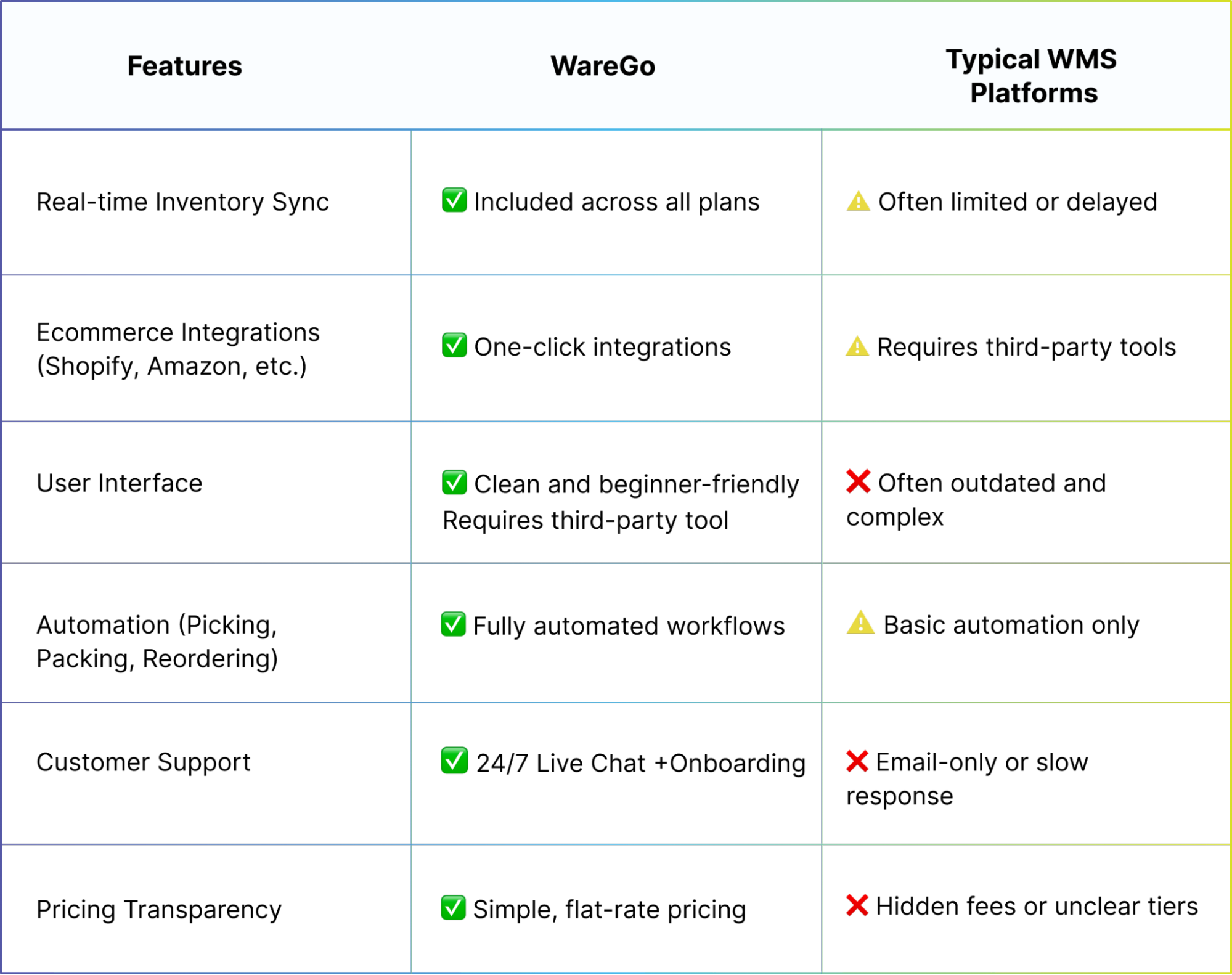
Today, we have hundreds of WMS software in the market, but finding the one that aligns with the pace and pressure of an ecommerce business is difficult. However, with WareGo, you do not need to worry about your business as it is built to automate ecommerce processes and earn visible results.
WareGo is built with modern online retailers in mind and offers smart solutions like real-time visibility in inventory, order processing that is as fast as lightning, and convenient and quick integrations with popular ecommerce platforms like Shopify, Amazon, WooCommerce, and more.
Our Warehouse system for ecommerce is suitable for clients of all horizons. So, if you are managing a single warehouse or online store or have a chain of warehouses across the nation, this software has got your back.
WareGo helps simplify the daily operations of an ecommerce business while reducing manual errors. Also, our tool offers brilliant scalability, which makes it even better for flourishing businesses. When it comes to features, we make sure our clients get it all.
Our built-in automation, user-friendly dashboards, and smart reporting make sure warehouse staff spend less time correcting errors and more time delivering timely orders.
Finding our WMS for ecommerce too good to be true? Reach out to our customer care team to get a free demo today.
WareGo adapts to your unique business needs and simplifies your workflow from end to end by eliminating bottlenecks, manual updates, or warehouse guesswork.
Connect With WareGo Consultant NowConclusion:
The ecommerce industry is flourishing with every passing second, and fast fulfillment, inventory accuracy, and scalability have become more important than ever before. However, if you successfully choose the right warehouse system for ecommerce, you can combat the increasing customer needs by leveraging features like clear visibility, automation, and end-to-end control that make you competitive and offer sustainable growth.
Our blog post involved 13 of the best warehouse management systems for ecommerce, each with unique features and advantages. We aimed to help our readers make a sound choice that keeps their time and investment in safe hands.
However, for businesses searching for a WMS solution designed specifically for ecommerce companies, WareGo is exactly what you need.
FAQs – Best wms for ecommerce
What is WMS in ecommerce?
A WMS in ecommerce refers to a software that supports ecommerce businesses in managing and controlling their warehouse and inventory operations. This includes the complete order fulfillment cycle from when products enter the warehouse until they are delivered to the customer. ecommerce warehouse software is a vital element of ecommerce operations that offers time-conscious visibility into the business’s inventory, whether inside warehouses or in transit. Besides managing inventory, a WMS for e-commerce comes with other features, such as picking and packing processes, labor management, reporting and analytics, and more.
What is warehouse management in e-commerce?
In e-commerce, warehouse management includes every aspect of warehouse operations, such as goods storage, order tracking, and end-to-end order fulfillment. It consists of the entire cycle from receiving products to delivering them to customers. Warehouse management also involves managing inventory, optimizing storage locations, dealing with returns, and making order fulfillment efficient.
What is the best wms for online retailers?
WareGo is the best wms for online retailers that offers features like real-time inventory management, order fulfillment, and integrations with all ecommerce platforms. With ample customer satisfaction reviews and 4.8 ratings on Google, this WMS makes processes efficient for ecommerce owners and their teams.
Which system is known as one of the best wms for ecommerce?
Various software touch the bar of best WMS for ecommerce, but if you are seeking one in particular, WareGo is a way to go. It is reviewed and regarded as the best choice for small to medium-sized ecommerce companies. It stands out for its brilliant features that include inventory visibility, order automation, and overall operational efficiency. Other best WMS include Manhattan Associates, Cin7, FishBowl, etc.
